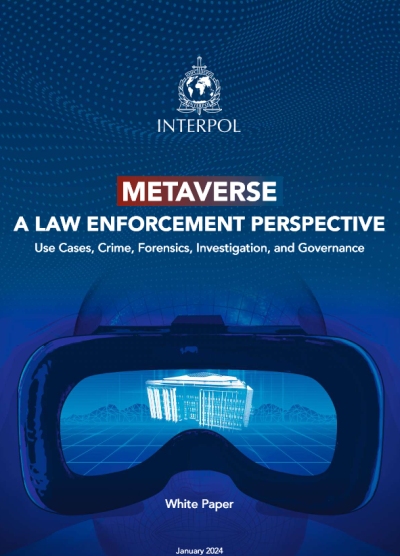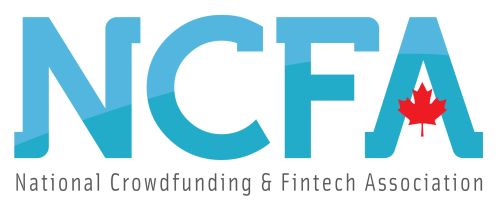Report | Jan 31, 2024


Lifting the Veil of A New Phygital Frontier for Law Enforcement
INTERPOL recently published a whitepaper providing an insightful analysis of the Metaverse from a law enforcement perspective, focusing on the unique challenges and opportunities it presents from use cases, crimes, forensics, investigations, and governance. The Metaverse, a blend of augmented, virtual, and physical realities, offers a new realm where digital transformation in policing can greatly enhance operational efficiency and public safety. However, it also opens doors to novel criminal activities, termed "Metacrime," requiring new strategies for law enforcement and judicial systems to adapt to this evolving digital landscape.
Metacrime
Metacrime refers to a range of criminal activities that emerge within the Metaverse, a digital realm that blends augmented, virtual, and physical realities. These crimes exploit the unique features and capabilities of the Metaverse, extending beyond traditional cybercrimes to include new, unprecedented forms of illegal activity.
See: Economist Impact Report: Unfolding the Metaverse
Metacrimes encompass various illegal activities such as:
- NFT Frauds: Deceptive practices involving Non-Fungible Tokens, including counterfeit NFT creations and sales.
- Cyber-Physical Attacks: Attacks that target virtual representations of physical infrastructure, causing real-world consequences.
- Identity Theft and Impersonation: Stealing digital identities, deepfakes, and impersonating avatars for criminal purposes.
- Theft of Virtual Assets: Illegal acquisition or manipulation of virtual properties and assets within the Metaverse.
- Grooming and Exploitation: Predatory behaviors targeting minors or vulnerable individuals within virtual environments.
- Financial Crimes: Including money laundering and fraudulent transactions using virtual currencies or assets.
Opportunities and Challenges
+ The Metaverse enables advanced training and simulation for law enforcement, creating immersive environments for practicing crisis management and tactics without real-world risks.
+ It also facilitates virtual meetings and operational coordination, offering platforms for information sharing, training, and reconstructing crime scenes virtually for better situational awareness.
See: AI and the Metaverse: The Imperative for Rules and Regulations
- Metacrime includes various illegal activities like NFT frauds, cyber-physical attacks, impersonation by theft of digital identities, theft of virtual assets, grooming of children, and more. INTERPOL's white paper stresses the necessity for a standardized approach to address these challenges, as the Metaverse encompasses multiple jurisdictions and legal ambiguities.
- The Metaverse also presents unique challenges for evidence collection and crime investigation. Traditional physical evidence is replaced by digital interactions, necessitating law enforcement to adapt to new methods for collecting and analyzing digital evidence, such as endpoint forensics, server investigations, and blockchain analytics.
Metacrime poses unique challenges to law enforcement due to the Metaverse's lack of standardized protocols, its decentralized nature, and the blending of digital and physical realities that may cross multiple legal jurisdictions. Addressing Metacrime requires new forensic techniques, international cooperation, and a deep understanding of emerging technologies and virtual environments.
Outlook
The collaborative effort between INTERPOL, government bodies, and private sectors is essential in shaping a secure Metaverse. This pioneering effort by INTERPOL is a significant step towards tackling the complexities of Metacrime, ensuring a safer and more secure digital world.
See: Gensler’s Remarks at 2023 Securities Enforcement Forum
Despite its challenges, the Metaverse offers significant opportunities for law enforcement, including advanced simulation for training, virtual crime scene preservation, and immersive training platforms. These advancements can potentially transform law enforcement practices and improve efficiency and effectiveness.

 The National Crowdfunding & Fintech Association (NCFA Canada) is a financial innovation ecosystem that provides education, market intelligence, industry stewardship, networking and funding opportunities and services to thousands of community members and works closely with industry, government, partners and affiliates to create a vibrant and innovative fintech and funding industry in Canada. Decentralized and distributed, NCFA is engaged with global stakeholders and helps incubate projects and investment in fintech, alternative finance, crowdfunding, peer-to-peer finance, payments, digital assets and tokens, artificial intelligence, blockchain, cryptocurrency, regtech, and insurtech sectors. Join Canada's Fintech & Funding Community today FREE! Or become a contributing member and get perks. For more information, please visit: www.ncfacanada.org
The National Crowdfunding & Fintech Association (NCFA Canada) is a financial innovation ecosystem that provides education, market intelligence, industry stewardship, networking and funding opportunities and services to thousands of community members and works closely with industry, government, partners and affiliates to create a vibrant and innovative fintech and funding industry in Canada. Decentralized and distributed, NCFA is engaged with global stakeholders and helps incubate projects and investment in fintech, alternative finance, crowdfunding, peer-to-peer finance, payments, digital assets and tokens, artificial intelligence, blockchain, cryptocurrency, regtech, and insurtech sectors. Join Canada's Fintech & Funding Community today FREE! Or become a contributing member and get perks. For more information, please visit: www.ncfacanada.org .
Related Posts
- SEO Powered Content & PR Distribution. Get Amplified Today.
- PlatoData.Network Vertical Generative Ai. Empower Yourself. Access Here.
- PlatoAiStream. Web3 Intelligence. Knowledge Amplified. Access Here.
- PlatoESG. Carbon, CleanTech, Energy, Environment, Solar, Waste Management. Access Here.
- PlatoHealth. Biotech and Clinical Trials Intelligence. Access Here.
- Source: https://ncfacanada.org/metacrime-in-the-metaverse/
- :is
- :where
- 150
- 2018
- 2023
- 250
- 31
- a
- acquisition
- activities
- activity
- adapt
- address
- addressing
- advanced
- advancements
- affiliates
- AI
- also
- alternative
- alternative finance
- an
- analysis
- analyzing
- and
- approach
- artificial
- artificial intelligence
- AS
- Assets
- At
- Attacks
- augmented
- Avatars
- become
- between
- Beyond
- Blend
- blending
- blends
- blockchain
- bodies
- by
- cache
- CAN
- Canada
- capabilities
- cases
- causing
- challenges
- charges
- Children
- closely
- Collecting
- collection
- community
- company
- complexities
- Consequences
- cooperation
- coordination
- Counterfeit
- create
- Creating
- creations
- Crime
- Crimes
- Criminal
- crisis
- Cross
- Crowdfunding
- cryptocurrency
- currencies
- cybercrime
- decentralized
- deep
- digital
- Digital Assets
- Digital Transformation
- digital world
- distributed
- doors
- due
- Economist
- ecosystem
- Education
- efficiency
- effort
- emerge
- emerging
- emerging technologies
- enables
- encompass
- encompasses
- enforcement
- engaged
- enhance
- ensuring
- Entertainment
- environments
- essential
- Ether (ETH)
- evidence
- evolving
- Exploit
- extending
- faces
- facilitates
- Features
- finance
- financial
- financial fraud
- financial innovation
- fintech
- focusing
- For
- Forensic
- forensics
- forms
- Forum
- fraud
- FRAUD PREVENTION
- from
- Frontier
- funding
- funding opportunities
- get
- Global
- Government
- greatly
- helps
- High
- However
- http
- HTTPS
- identities
- Illegal
- immersive
- Impact
- imperative
- improve
- in
- include
- includes
- Including
- individuals
- industry
- information
- Infrastructure
- Innovation
- innovative
- insightful
- Insurtech
- Intelligence
- interactions
- International
- INTERPOL
- Investigations
- investment
- involving
- IT
- ITS
- Jan
- jpg
- judicial
- jurisdictions
- Lack
- Laundering
- Law
- law enforcement
- Legal
- like
- management
- Manipulation
- Market
- max-width
- May..
- meetings
- member
- Members
- Metaverse
- methods
- minors
- money
- Money Laundering
- more
- MSN
- multiple
- Nature
- necessity
- networking
- New
- NFT
- novel
- of
- offering
- Offers
- on
- opens
- operational
- opportunities
- or
- over
- Paper
- partners
- payments
- peer to peer
- perks
- phygital
- physical
- Platforms
- plato
- Plato Data Intelligence
- PlatoData
- please
- policing
- poses
- potentially
- practices
- predatory
- presents
- preservation
- Prevention
- private
- projects
- properties
- protocols
- provides
- providing
- public
- published
- purposes
- range
- real world
- realities
- realm
- recently
- refers
- Regtech
- regulations
- replaced
- report
- requires
- rules
- s
- safer
- Safety
- sales
- scene
- scenes
- SEC
- SEC charges
- Sectors
- secure
- Securities
- server
- Services
- shaping
- sharing
- significant
- simulation
- stakeholders
- standardized
- Step
- Stewardship
- strategies
- such
- Systems
- tackling
- tactics
- Target
- targeting
- techniques
- Technologies
- that
- The
- The Metaverse
- theft
- theory
- These
- this
- thousands
- to
- today
- Tokens
- towards
- traditional
- Training
- Transform
- Transformation
- understanding
- unfolding
- unique
- unique features
- unprecedented
- unregistered
- using
- various
- vibrant
- Virtual
- virtual assets
- virtual currencies
- Virtual Meetings
- virtually
- Visit
- Vulnerable
- white
- white paper
- Whitepaper
- with
- within
- works
- world
- zephyrnet












